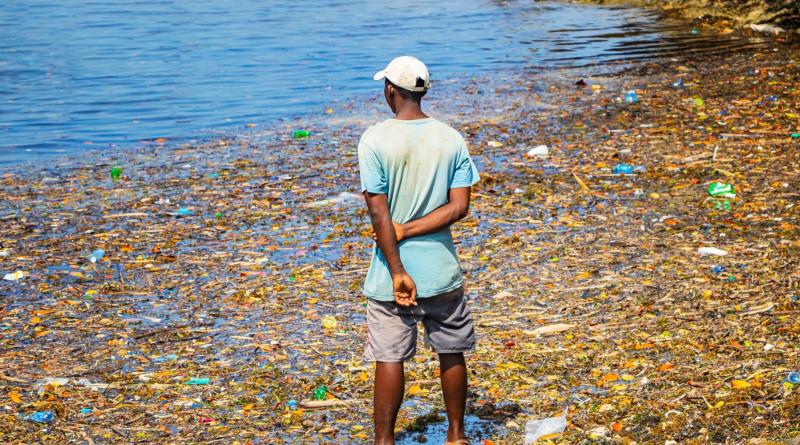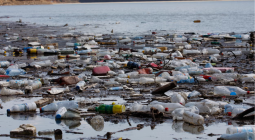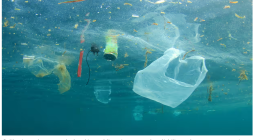African oceans: the green revolution against the plastic tide

With around 8 million tonnes of plastic dumped in the oceans every year, plastic pollution is threatening marine ecosystems on the African continent. Innovative solutions and local initiatives are emerging to tackle the problem. From transforming waste into building materials to advanced monitoring technologies, companies and nature conservation organisations are getting into the thick of the battle.
Put a stop to plastic pollution! Plastic pollution has become a major threat to marine ecosystems, affecting the seas and oceans around the African continent. According to the United Nations Environment Programme (UNEP), some 8 million tonnes of plastic end up in the oceans every year, and much of this pollution reaches the coasts of Africa. The consequences are disastrous, with marine life ingesting the plastic, destroying natural habitats and contaminating the food chain.
In West Africa, for example, the beaches of Ghana and Nigeria are invaded by plastic debris. Studies conducted by the University of Cape Town in South Africa show that 90% of seabirds autopsied after death had plastic fragments in their stomachs. Coral reefs, which are essential to marine biodiversity and local fishing, are also threatened by this pollution. Plastic waste encourages the proliferation of harmful algae, upsetting the ecological balance of the reefs.
Operation Clean Sweep (OCS)
In response to this crisis, a number of local and regional initiatives have been launched to combat plastic pollution. In South Africa, Operation Clean Sweep (OCS) aims to prevent industrial plastic granules from entering the marine environment. In a global context where more than 230,000 tonnes of granules are dumped into the marine environment every year, this voluntary initiative by the plastics industry has already led to a significant reduction in granule leaks, thanks to the commitment of various organisations and companies in the plastics sector.
Sasol, a giant in the chemical industry, and Sapro (South African Plastics Recycling Organisation), which represents 42 of the main plastics recyclers in the rainbow nation, have signed up to the OCS commitment. Other organisations such as Petco , Polyco, and the Polystyrene Association of SA, which have also signed the OCS commitment, are implementing rigorous measures to prevent plastic granules from being spilled during transport or production. This involves training the staff of signatory companies in best practices for avoiding plastic granule spills, and implementing OCS kits in industrial facilities to minimise the risk of spills.
“African governments must adopt strict regulations on the use and disposal of plastics. Local initiatives are crucial, but without support and a regulatory framework, they will not be able to achieve their full potential,” warns Themba Dlamini, a waste management expert at the University of Cape Town.
More than 20 tonnes of plastic turned into paving stones
In Kenya, the start-up Gjenge Makers transforms plastic waste into durable paving stones for construction. These paving stones are not only environmentally friendly, but also more resistant and less expensive than traditional materials. In 2020, this initiative recycled more than 20 tonnes of plastic, reducing the amount of waste ending up in rivers and oceans.
Ivory Coast, which is just as vulnerable as South Africa and Kenya, is at the forefront of solutions to reduce marine pollution. The “Plastic Waste Management Program” project run by the non-governmental organisation (NGO) Conceptos Plasticos uses plastic waste to build schools. Since 2018, more than 500 tonnes of plastic have been recycled in the land of elephants, offering an innovative solution to the problems of pollution and education.
“Seeing children studying in schools built with recycled plastic bricks is immensely satisfying. Not only are we reducing pollution, but we are also providing quality education”, says Marie Kouadio, head of the Plastic Waste Management project in Ivory Coast.
The contribution of technological innovations
Technological advances are playing a crucial role in the fight against plastic pollution in Africa’s marine environments. The use of drones to monitor beaches and coastlines makes it possible to detect and map the areas most affected by plastic waste. In Nigeria, the start-up Wecyclers uses mobile applications to encourage recycling by rewarding users with points redeemable for consumer goods.
South Africa’s Plastics SA has developed a technology for automatically sorting plastics, thereby increasing recycling efficiency. Thanks to this innovation, the plastics recycling rate in South Africa reached 43% in 2021, one of the highest on the continent (Morocco should reach 55% by 2030).
Kenya’s “Flipflopi” initiative focuses on raising awareness
In East Africa, where 20% of the species on Lake Victoria are already threatened with extinction according to the International Union for Conservation of Nature (IUCN), the “Flipflopi” initiative has built a boat out of recycled plastic to raise awareness of the importance of recycling. Since its launch, the boat has sailed along the Kenyan coast, organising clean-up campaigns and educational workshops in local communities. “Plastic pollution is a global problem, but the solutions must be local. By educating the younger generation about the dangers of plastic and the benefits of recycling, we can change attitudes and behaviours,” explains John Kamau, an environmental activist based in Mombasa, a port city in southern Kenya on the Indian Ocean.






